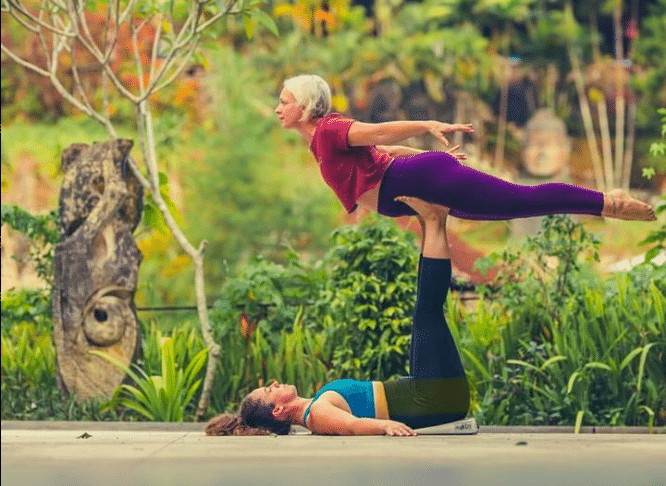Imposter syndrome is a term many of us have become all too familiar with. It’s that nagging feeling that you’re not good enough, that you don’t belong, or that your achievements are the result of luck rather than skill. Whether it’s at work, in social settings, or even in hobbies, imposter syndrome can be debilitating. Even as a coach, who is educated and experienced with mindsets, there are times when imposter syndrome sneaks up on me too (I am human), and during my recent acro-yoga training in Vienna, with the fabulous Laura Ilona and Caspian Burrell from AcroSpirit was one of these times. But with a little hindsight, I was able to pull it all together and thought I’d share some of my insights here, where you may be able to relate and we can learn and improve together.
The Basics of Acro Yoga: A Metaphor for Life
Acro Yoga, a practice that combines acrobatics and yoga, requires trust, communication, and balance. One person, the “base,” supports another, the “flyer,” in various poses. There’s a third role, too: the “spotter,” who ensures safety and offers guidance. The dynamics of Acro Yoga mirror life’s challenges: navigating trust, overcoming fear, and finding balance.
When you’re new to Acro Yoga, it’s easy to feel like you don’t belong. You might watch others effortlessly perform poses and think, “There’s no way I can do that.” This is imposter syndrome at its finest—a voice in your head telling you that you’re not capable, even when there’s no evidence to support it.
Step 1: Start Where You Are
In Acro Yoga, everyone starts as a beginner. The same is true in life. Whether you’re entering a new job, learning a new skill, or stepping into a leadership role, it’s okay to be a beginner. The first step in overcoming imposter syndrome is to acknowledge where you are in your journey.
When you approach Acro Yoga with a beginner’s mindset, you allow yourself to learn and grow. Instead of focusing on what you can’t do, focus on what you can. Celebrate the small victories—like mastering a basic pose or feeling more comfortable trusting your partner. In life, this might mean acknowledging your small successes, whether it’s completing a project, receiving positive feedback, or simply showing up.
Step 2: Embrace the Support System
Acro Yoga is a partnership practice. It’s impossible to do it alone. The same goes for overcoming imposter syndrome. In Acro Yoga, you need to trust your base to support you, your spotter to catch you, and yourself to balance. Similarly, in life, you need to trust your colleagues, friends, and mentors.
When imposter syndrome strikes, it’s tempting to isolate yourself and believe that you have to do everything on your own. But just like in Acro Yoga, leaning on others can make all the difference. Reach out to your support system. Share your feelings of inadequacy with a trusted friend or mentor. Often, just voicing your concerns can help alleviate them.
Step 3: Reframe Your Fears
Fear is a natural part of Acro Yoga. Whether it’s the fear of falling, the fear of dropping someone, or the fear of looking silly, it’s something every practitioner faces. But fear can be reframed. Instead of seeing it as a barrier, view it as a sign that you’re pushing your boundaries and growing.
Imposter syndrome is rooted in fear—the fear of being exposed as a fraud. But what if you could reframe that fear? What if, instead of seeing it as proof that you don’t belong, you saw it as evidence that you’re stepping out of your comfort zone? Just as in Acro Yoga, where you learn to trust your partner and push past the fear of falling, you can learn to trust yourself and push past the fear of inadequacy.
Step 4: Practice and Persevere
No one becomes an expert in Acro Yoga overnight. It takes practice, patience, and perseverance. The same is true for overcoming imposter syndrome. You might not banish it entirely, but with consistent effort, you can manage it.
In Acro Yoga, each session builds on the last. You become more confident in your abilities, more attuned to your partner, and more skilled at the poses. Similarly, in life, each experience builds your competence and confidence. The more you practice self-compassion, seek support, and reframe your fears, the less power imposter syndrome will have over you.
Step 5: Celebrate Your Progress
Finally, don’t forget to celebrate your progress. In Acro Yoga, every pose you master is a victory. Every time you trust your partner and yourself a little more, you’re succeeding. In life, every step you take towards overcoming imposter syndrome is worth celebrating.
Take a moment to reflect on how far you’ve come. Acknowledge the challenges you’ve faced and the growth you’ve experienced. Just as in Acro Yoga, where even a small improvement in a pose can be a big win, in life, every bit of progress counts.
Finally: Balance and Trust, On and Off the Mat
Overcoming imposter syndrome is a journey, not a destination. It requires balance, trust, and a willingness to embrace discomfort—much like Acro Yoga. By starting where you are, embracing your support system, reframing your fears, practicing consistently, and celebrating your progress, you can gradually overcome the feelings of inadequacy and step into your true potential.
So, the next time you find yourself doubting your abilities, remember the lessons from Acro Yoga. Trust yourself, trust the process, and know that you are capable, worthy, and right where you need to be.

